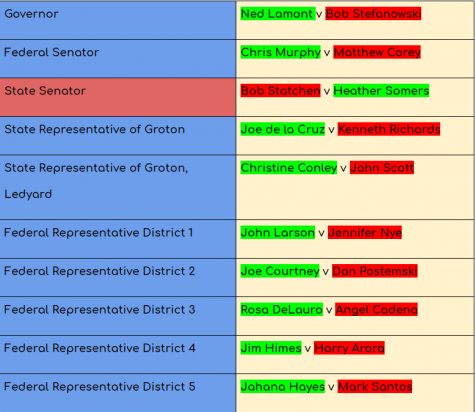The 2018 Midterm
November 15, 2018
Background Information
November 6th was a night of great importance to millions of Americans. Over 100 million citizens voted in the 2018 midterm, and the results were surprising all over the country. The midterm election in the middle of a President’s tenure is seen as a referendum on the President, and this was a critical moment for the Trump administration. The results were stunning for both sides of the aisle, and the next question many people are asking is: will this midterm affect the 2020 presidential election?
Connecticut Midterm Results
Over a million citizens in Connecticut voted on November 6th. The biggest concern for Connecticut voters was the result of the Governor race. Ned Lamont, the candidate for the Democrats, came out on top with 49 % of the vote in comparison to his Republican opponent Bob Stefanowski with 46 %. As the results came in, the balance of power switched back and forth; Lamont winning at one moment, and then Stefanowski the next. The election was swayed in favor of Ned Lamont when the results for New Haven rolled in. Due to such a close race, Ned Lamont was declared the victor in the afternoon of November 7th.
Other than the Governor race, incumbent Senator Chris Murphy won his re-election in a landslide, garnering almost 60 % of the vote. Matthew Corey conceded to Chris Murphy that night, and Murphy will return to Washington for his second term. In addition, the Democrats swept all five of the Congressional House of Representative seats that were up for grabs. John Larson, Joe Courtney, Rosa DeLauro and Jim Himes are set to return to Washington to serve the people of Connecticut once more in Congress. The fifth winner was Democratic nominee Jahana Hayes, who bested Republican Mark Santos by double digits. Jahana Hayes’ victory marked a historical moment in Connecticut politics: Jahana will be the first African-American female to hold an elected federal office in the state of Connecticut. In her emotional victory speech, she stated, “People have said to me ‘She doesn’t have what it takes. She’s not built for this.’ Not only am I built for this, I’m Brass City built for it.”
In local news, incumbent Christine Conley and Joe de la Cruz will continue to serve as the representatives of Groton and Ledyard in Connecticut’s State House. Republican Heather Somers, the current State Senator for the 18th District, defended her seat against Democratic challenger Bob Statchen. Upon declaring victory late that night, Somerstold her supporters, “This shows that when you are a Republican and work hard for your district, you can win against all odds.” In the region of Groton, Heather Somers was the only successful politician of the Republican Party.
Here is a table for the election results. On the left, it provides the list of positions that were on a state and local level. If the position has a blue filling, it means the winner was a Democrat, while if it has a red filling, it means the winner was a Republican. The green highlight represents the winner, and the red highlight represents the candidate who lost.

Key Results Around the Country
As the election unfolded on November 6th, many were surprised by the results. Key races (those that were considered most contentious by polling experts) included the campaigns in Florida, Georgia, Ohio, Texas, North Dakota, Wisconsin, Nevada and Illinois. The results are displayed on the chart below:

 Incumbents Bruce Rauner (R), Scott Walker (R), Dean Heller (R), and Heidi Heitkamp (D) have lost their positions by their challengers. JB Pritzker, a businessman representing the Democratic Party surmounted Bruce Rauner by double digits, obtaining over 50 % of the vote. Tony Evers (D) defeated Governor Scott Walker, a two-term governor. Incumbent Governor Brian Kemp of Georgia has temporarily beaten Stacey Abrams, as Mrs. Abrams is filing for a recount due to possible voter suppression and unethical activity conducted by the Kemp campaign. Finally, Andrew Gillum, Democratic hopeful in Florida, lost by little less than .5 % to Republican candidate Congressman Ron DeSantis. In comparison to all the campaigns listed above, the Florida Governor race was the closest election in the 2018 midterm. Jacky Rosen beat Republican incumbent Dean Heller in an upset victory, defeating Heller by almost 5 %. In Texas, Beto O’Rourke lost to incumbent Senator Ted Cruz by a close margin, 51 % to 48 %. Beto has flipped Texas from a “completely red state” to a possible purple/swing state in the upcoming 2020 election. Finally, Heidi Heitkamp lost her seat to Republican challenger Kevin Cramer, putting a dent in the Democrats’ minority in the Senate.
Incumbents Bruce Rauner (R), Scott Walker (R), Dean Heller (R), and Heidi Heitkamp (D) have lost their positions by their challengers. JB Pritzker, a businessman representing the Democratic Party surmounted Bruce Rauner by double digits, obtaining over 50 % of the vote. Tony Evers (D) defeated Governor Scott Walker, a two-term governor. Incumbent Governor Brian Kemp of Georgia has temporarily beaten Stacey Abrams, as Mrs. Abrams is filing for a recount due to possible voter suppression and unethical activity conducted by the Kemp campaign. Finally, Andrew Gillum, Democratic hopeful in Florida, lost by little less than .5 % to Republican candidate Congressman Ron DeSantis. In comparison to all the campaigns listed above, the Florida Governor race was the closest election in the 2018 midterm. Jacky Rosen beat Republican incumbent Dean Heller in an upset victory, defeating Heller by almost 5 %. In Texas, Beto O’Rourke lost to incumbent Senator Ted Cruz by a close margin, 51 % to 48 %. Beto has flipped Texas from a “completely red state” to a possible purple/swing state in the upcoming 2020 election. Finally, Heidi Heitkamp lost her seat to Republican challenger Kevin Cramer, putting a dent in the Democrats’ minority in the Senate.
Besides the Senate and Governor races, the House of Representatives flipped from being controlled by the Republicans to the Democrats. The Democrats now hold 230 seats in the House, and the Republicans hold 198. As of now, there are still a couple of undeclared seats. With the Democrats now in control of the House, Trump and the Republicans will have some opposition in the federal government. Without the House, what does this mean for the Trump administration going forward?

Election Analysis & Going Forward
Before the midterm, the Republicans owned the House, Senate, and Executive. The Speaker of the House is, currently, Paul Ryan, who was voted in by the Republican caucus. When January rolls around and the newly elected Congress is inaugurated, Nancy Pelosi, the Minority Leader for the Democratic caucus, is speculated to ascend to the Speakership once again. Going forward, Trump will now have opposition in one chamber of Congress. The House will, according to Pelosi, provide a fair and appropriate check on the Senate and President. Also, this means that Trump and his administration are now officially liable to Congressional investigation by the House. Even though the Democrats won control of the House, they lost three seats in the Senate, and this has given President Trump and Senate Majority Leader Mitch McConnell an advantage.

The Senate advises and consents to all of the nominees that the President nominates. The House of Representatives has no say in any of the nominations the President makes. With the Republicans now having an even larger majority in the Senate, President Trump’s nominees will have an easier time being confirmed and processed. All in all, the Democrats will now be able to check the President with the constitutional abilities that are granted to the House; however, the Democrats’ position has been heavily weakened in the Senate.

This 2018 midterm has been historic. Voter turnout and registration was through the roof, and enthusiasm on both sides was high. More women have been elected in this election cycle than any previous election cycle in history. No President since Ronald Reagan has gained more than two seats in the Senate during a midterm election, and President Trump has now broken this streak.
Many people on the left promised a “Blue Wave” was coming. This “Blue Wave” signified a massive victory in favor of the Democrats as a result of the unpopularity of President Trump (whose  approval rating is under 45 %). However, there was no blue wave. If anything, it has been described as a ripple. Even though the Democrats took ownership of the House and gained many Governorships, they lost to many Senate seats. Due to this, there was no blue or red wave in this election cycle, just, if anything, a blue ripple.
approval rating is under 45 %). However, there was no blue wave. If anything, it has been described as a ripple. Even though the Democrats took ownership of the House and gained many Governorships, they lost to many Senate seats. Due to this, there was no blue or red wave in this election cycle, just, if anything, a blue ripple.
Conclusion
Just as Robert Kennedy once said, “Elections remind us not only of the rights but the responsibilities of citizenship in a democracy.” The 2018 midterm, and the elections to come, are a symbol of our democratic values, and each election reminds us of our civic duty as members of a republic.
 Despite the results of this election, it is important to acknowledge the victories of every candidate across the nation. Each candidate was voted in by citizens just like you and I, and were elected based off of the people. Now, as 2018 comes to a close, it is vital to recognize the real importance of this election: despite the political divisiveness that has been displayed in the last few elections, we are all Americans who want to witness the best that is to come.
Despite the results of this election, it is important to acknowledge the victories of every candidate across the nation. Each candidate was voted in by citizens just like you and I, and were elected based off of the people. Now, as 2018 comes to a close, it is vital to recognize the real importance of this election: despite the political divisiveness that has been displayed in the last few elections, we are all Americans who want to witness the best that is to come.










































